
My big fat Spanish wedding
“To consecrate our union to God is a desire that’s always been in our hearts.”
Pillar subscribers can listen to this article here: The Pillar TL;DR
Last week, at a parish just a few miles north of Madrid, 18 couples celebrated the first ‘macro-wedding’ in Spain.
The couples, who had all been cohabiting for at least five years, entered into the relationship of marriage on August 29, after months of preparation at San Sebastián Mártir Parish.
Spain is known as one of the most traditionally Catholic countries in the world. However, only 20% of weddings in the country take place according to canonical form, which is required by the Church for Catholics to validly contract marriage.
The parish priest, Fr. Javier Sánchez-Cervera, had noticed that most of the couples coming to his parish to baptize their children or register them for First Communion catechesis were unmarried. Many of them were migrants, making the prospect of getting married complex. Others believed they couldn’t afford to get married.
So the priest decided something needed to be done.
So the idea of the macro-wedding was born — a day of celebration involving just about everyone in the town of San Sebastián de los Reyes, from the mayor and the local media to the town’s hairdresser and the catechists of the parish.
‘Your dream can come true’
“When I took possession of the parish in September 2020, the outgoing pastor told me that most of the families coming to baptize their children or to enroll them in catechesis are not married,” Sánchez-Cervera told The Pillar.
“Then, you speak with them and you see there is a desire, but it doesn’t seem attainable,” he added.
In a country like Spain, where the average wedding costs almost $20,000, marrying seems like an impossible dream to many. Sánchez-Cervera believes that there is too much social pressure on couples to have the “perfect” wedding, while modern society has diluted the value of the marriage itself.
“The business of weddings has increased, it is more complicated, more sophisticated, more expensive than ever. Marriage is socially the subject of mockery and laws have dissolved and annulled the value of marriage,” he added.
“Then, you add that many of these parishioners are migrants from Latin America, so they don’t have their extended family with them, nor they can bring them. Some don’t have many friends, and, for a couple, to have a wedding without anyone to celebrate it with can be a very humiliating experience.”
Aware of this context, Sánchez-Cervera began talking about the idea of a macro-wedding with parishioners, the archdiocese of Madrid, and the municipal government.
“People looked funny at me when I mentioned the idea. But Pope Francis says in Evangelii Gaudium that he prefers ‘a Church which is bruised, hurting and dirty because it has been out on the streets, rather than a Church which is unhealthy from being confined and from clinging to its own security’.”
“I think the Church has lacked creativity and courage to face the banalization and commercialization of marriage, which is a tragedy,” he added.
The priest initially floated the idea a year-and-a-half ago. Then, in March of this year, he met with the municipal authorities to ask for their support. He also asked local media to cover the initiative, in order to help find couples who wanted to participate.
“The municipality helped, and I formed a team with a lot of parishioners…We put a big poster on the back of the church looking at the town hall square with a QR code that said ‘Macro-wedding: Your dream can come true.’ And we promoted the event in the Masses on Saturday and Sunday, explaining in detail afterwards to those interested what this was all about.”
“Then, we had a short, two-minute clip in local media, in which people from the parish explained the macro-wedding, and by the first Sunday we already had four couples interested in getting married. We eventually got to 23 couples, of which 18 finished the process.”
‘A great step in the love of God’
Margarita, from Colombia, found out about the macro-wedding through the poster in the back of the church.
“When I saw it, I spoke with [my now-husband] Daniel Felipe and spoke with Graciela, the coordinator, who explained to us what it was about, and all the requirements and details of the event.”
Margarita and Daniel, who have been together since 2019 and lived in Spain for the past three years, say they were moved by God to make the decision.
“We were moved by our faith in the Lord and the desire to put him in the center of our relationship. We wanted God to bless our home, and once we saw the opportunity, we decided to take it.”
Others found out about the wedding in all kinds of ways.
“One guy saw the poster in the square, scanned the code, and enrolled in the process without telling his girlfriend. Only later he told her they would get married,” Sánchez-Cervera said laughing.
“Some people found out via WhatsApp. One of the women worked in a house and found out because the family told her about it and encouraged her to get married, and one even found out through a municipal official who told her about it,” he added.
“God is present even in Google’s algorithm,” Amalia, a Venezuelan, told The Pillar. “We saw an article on a website that said ‘the first macro-wedding in Spain’ and surprise: it was in our beloved parish of San Sebastián Mártir.”
Amalia and Andrés married civilly almost 15 years ago, and moved to Spain. They had Andrés, their only son, nine years ago, but kept postponing a religious wedding.
“We’ve always wanted to marry in the Church, so when we got married back in Venezuela, we said ‘next year we marry in the Church,’ and we continued saying that every year, and kept postponing it,” she says.
“But this year was finally ‘next year’,” she added with a smile.
“To consecrate our union to God is a desire that’s always been in our hearts,” Amalia and Andrés told The Pillar.
“It’s like what Neil Armstrong said when he set foot on the moon. It might seem a small step for us, but is a great step in the love of God in our union,” Amalia added.
Preparing for marriage - and a wedding
The couples’ personal situations are varied—many are migrants from Colombia, Venezuela, and even Italy. Most have children, some even adults. Of the couples, 12 were previously unmarried, six were civilly married, and one couple were divorcees from previous relationships. Three of the now-husbands are not baptized, but Sánchez-Cervera said they would start catechesis in January.
Sánchez-Cervera decided to appoint ‘tutors’ for each couple to help them navigate through the marriage preparation process.
Tutors are parishioners who had an introductory conversation with each couple to understand their personal situation and explain the sacrament they would receive.
In some cases, there were practical challenges.
“Most of them are migrants, so it was hard to find all baptismal certificates. In some cases, we needed to apostille the birth certificates, which is a bit of a process and quite expensive in some Latin American countries, like Venezuela, and takes a while,” said Sánchez-Cervera.
“Tutors were there not only to offer spiritual or personal support, but also to help with these practical things. They helped them find the phone number or email of the parish where they were baptized, they investigated how to get an apostille, and even paid for them if necessary,” the priest said.
“Our tutors helped us check out what we needed to do to get all the documents and start all legal procedures,” Yohana, from Colombia, said.
“We’ve felt very close to the Church in this time thanks to a lot of people who’ve put their effort, their time, their work to make this happen. I didn’t think so many people would commit themselves to the wedding. My husband asked me to marry him three years ago, but due to money issues and other problems we hadn’t taken the step, but now we were able to do it.”
Dealing with all the finances of the wedding was essential for the initiative to be successful—one of the big draws of the macro-wedding was the fact that it would be free for the couples.
“We wanted to arrange everything. The couples participating in the wedding should only concern themselves with saying yes to God, we would handle everything else,” Sánchez-Cervera said.
“The idea is that you prepare for marriage, not for a wedding.”
The local community pitched in to help.
“The people did everything. People donated dresses, others helped tailor them, women in the parish volunteered to do the nails of the bride, the owner of a hairdresser nearby volunteered to do the hair of the brides,” the priest said.
“We had a big team of volunteers to decorate the church for the wedding, and make the bridal bouquets and all the flowers for the church.”
The owners of the houses in front of the church lent their balconies so the press could cover the event, and the café by the church lent its parking lot for the couples and their families.
The parish hall became a beauty salon the afternoon of the wedding—and the town hairdresser said she plans to join next year’s macro-wedding as a bride.
“The town really responded to the celebration. Everyone was getting involved,” Sánchez-Cervera said.
However, there was one more issue to figure out: In Spain, a wedding without a party is unthinkable.
“It is impossible to think of not having a celebration, but also organizing a party ourselves for 18 couples was simply too complicated. It’s too much logistics and it put the focus where we didn’t want it to be,” Sánchez-Cervera told The Pillar.
“But we had a solution: Holding the wedding on August 29, the day after one of the largest [town] celebrations…the feast of the Christ of the Remedies, as the whole town is celebrating throughout the week.”
A couple of blocks from the church there was a fair organized for the town’s feast, with food stands, live music, and attractions for children.
“So, everyone was invited to the celebrations. The bands would provide the concert, and we spoke with the associations of the town and the food stands so they knew about the event…And the town hall supported us in this decision,” he added.
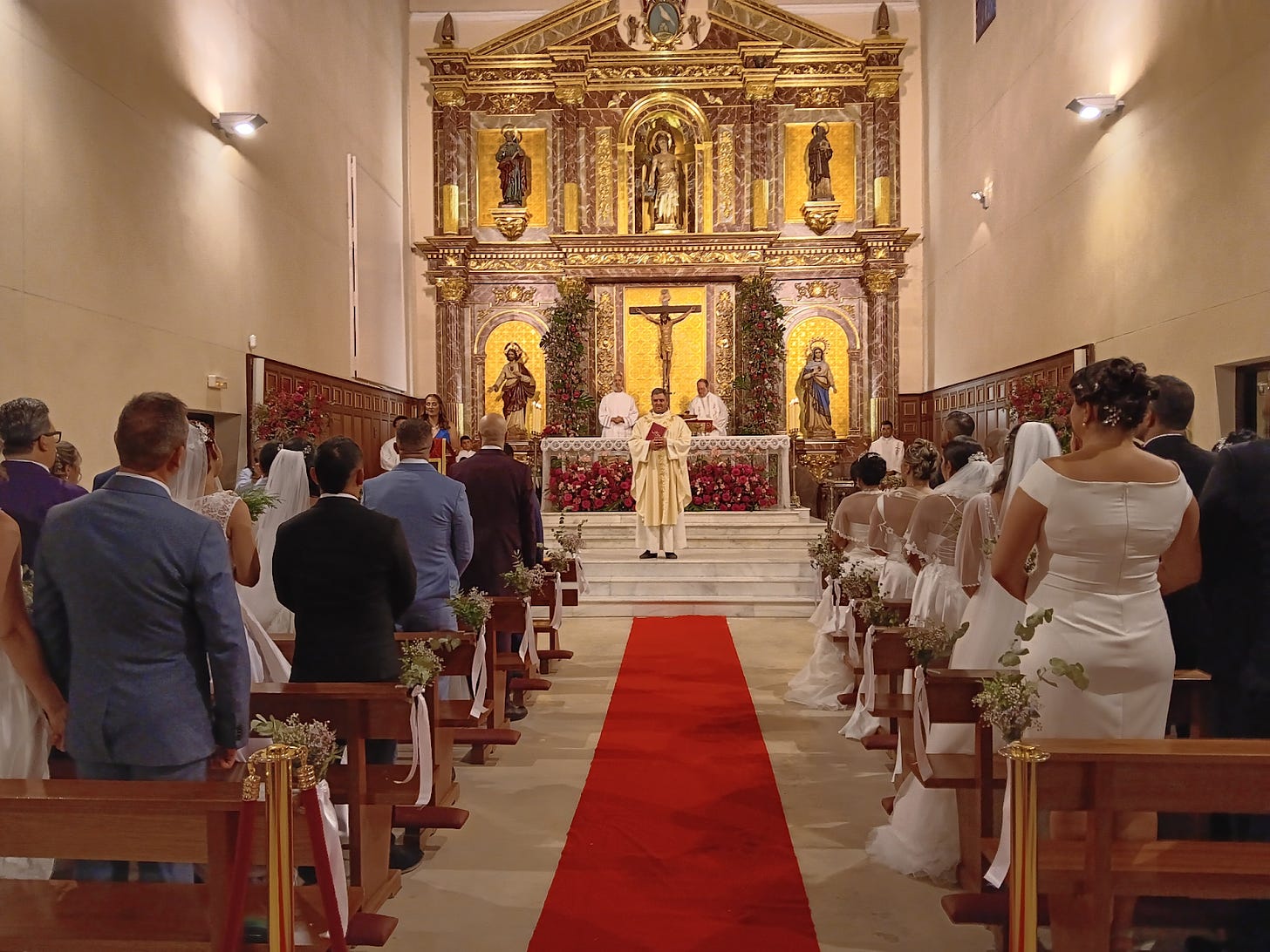
Building on success
Reflecting on the macro-wedding, Sánchez-Cervera said he has already seen the process bearing fruit in the lives of some of the couples.
“Some of the couples even mentioned the pain they experienced at not being able to receive the Eucharist because of their situation and how that moved them to enroll. After some months of prayer and discernment, a few couples even decided to start living as brother and sister until the wedding,” he said.
“The lesson of the wedding at Cana is clear: a marriage without Christ is a marriage destined to failure,” he said.
Some of the couples encouraged others to not let obstacles stop them from taking this sacramental step.
“There’s a lot of myths surrounding relationships, you know, that if you get married the relationship will go south,” Margarita told The Pillar. “This is not true, if God is in the center of your union, all problems, all situations can be solved by leaving everything in His hands. Don’t let the devil draw you away from God, he’s the one who wants you living in sin. But if you put God in the center, you can overcome everything.”
Asked if he wants to repeat the macro-wedding next year, Sánchez-Cervera said he’d like to see it grow.
“I’d love it if next year, 20 parishes or 50 parishes of the archdiocese, including ours, did a macro-wedding. We’re writing a report so the archdiocese can study seriously the possibility of making use of this format of celebration of marriage for the whole diocese.”
Sánchez-Cervera said that they already have couples interested in participating in a macro-wedding next year.
“We still have a lot of unmarried couples coming to baptize their children, and when we ask them about getting married they look at us with a poker face. But when we tell them we organized the macro-wedding, their face changes and they think it’s a good idea,” he said.
“You don’t have to spend anything. You don’t have to waste your time. You just have to say yes to the Lord and focus on that. It’s a pretty good deal, isn’t it?”

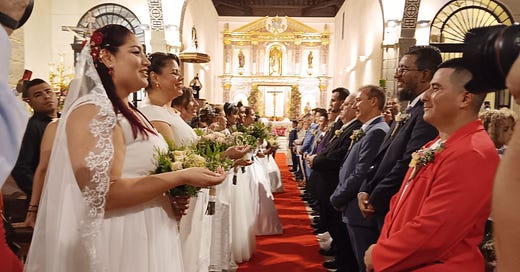


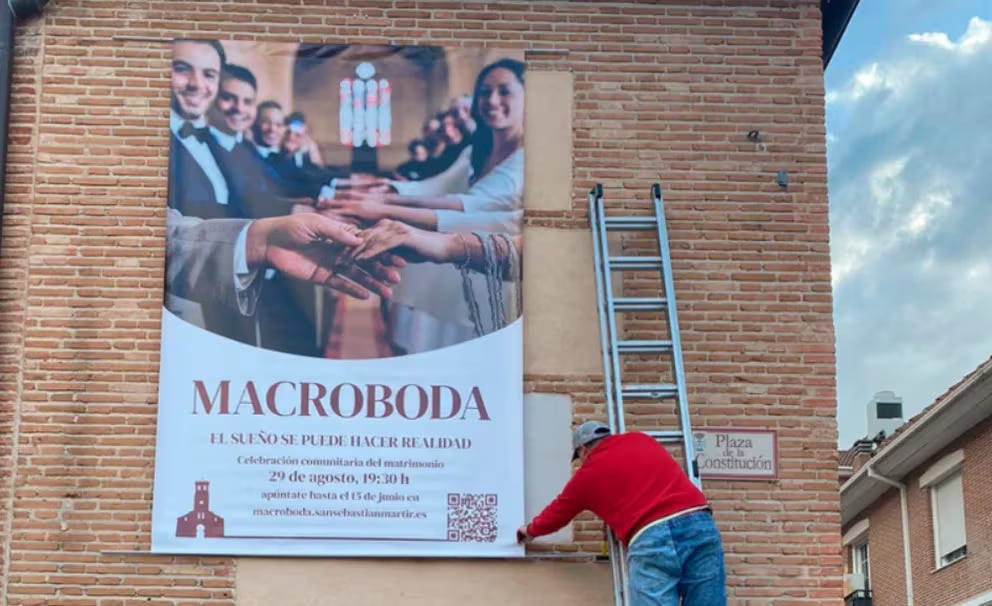
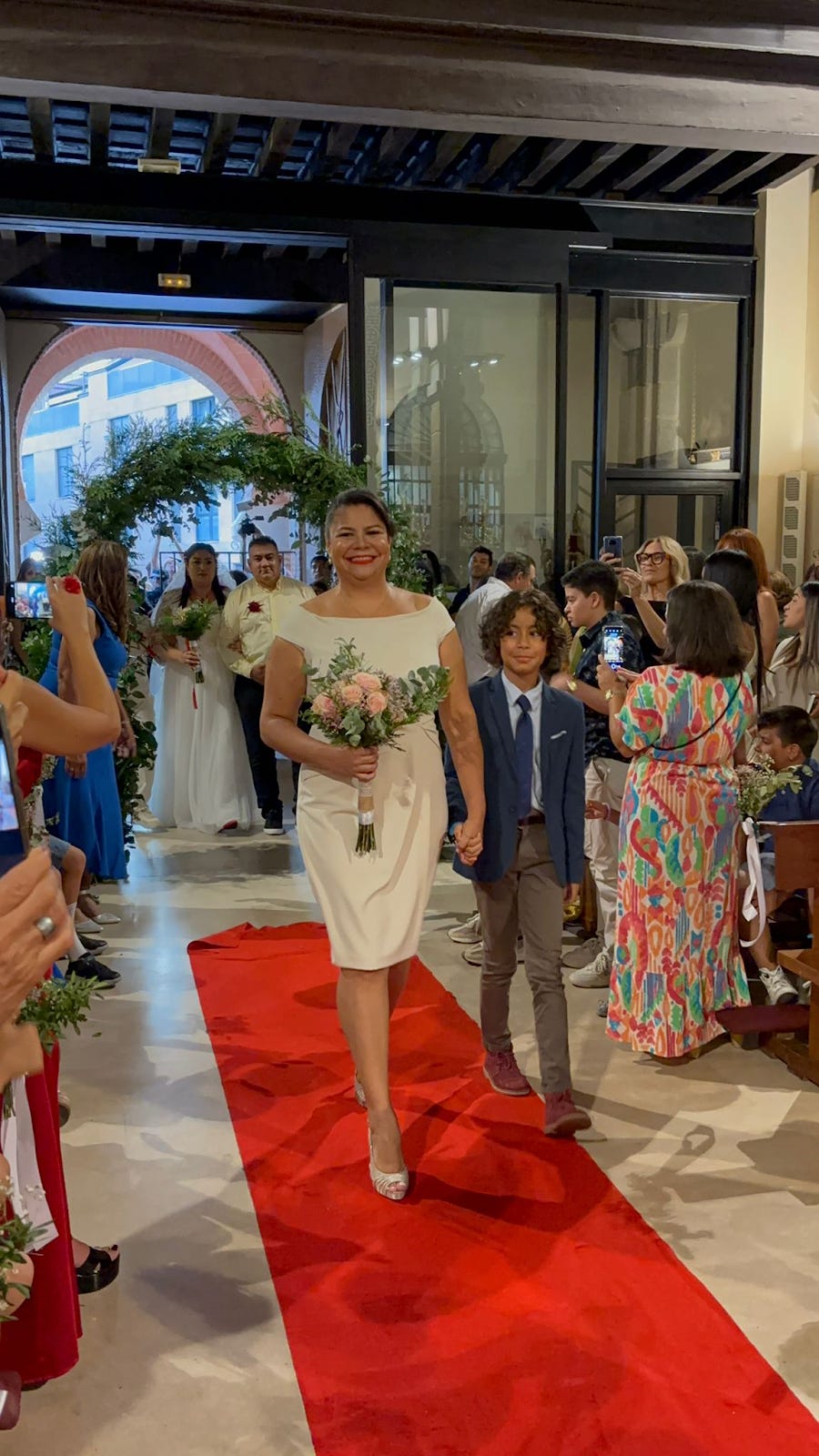
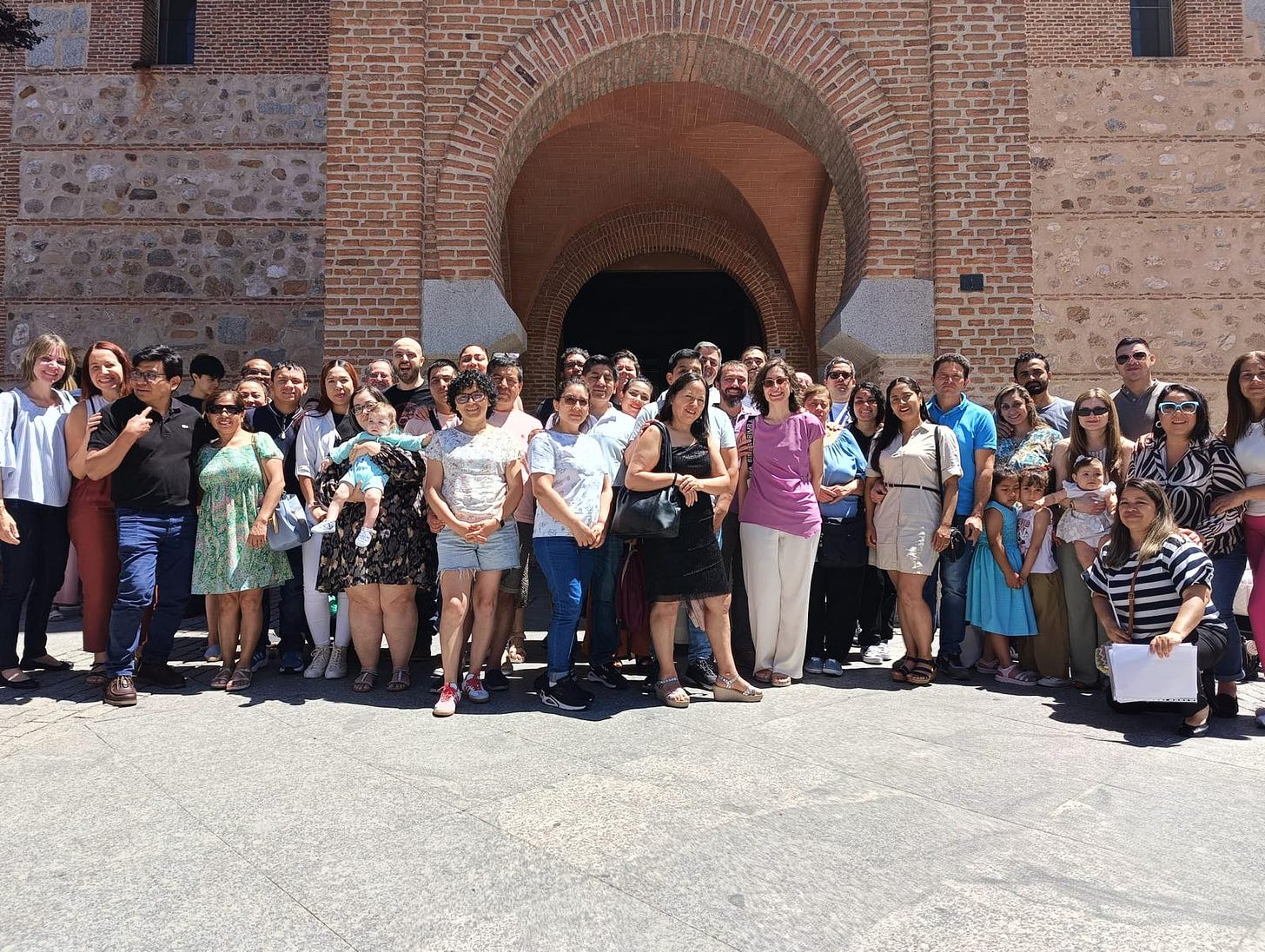








I love this—couples get to regularize their marital situations and grow closer to God (which also benefits their children), the whole community turns out in support, other people are inspired by their example (like the hairdresser), migrants are helped to integrate into their new homes, *and* the newlyweds get a huge party, for free. Kudos to Fr. Sanchez-Cerverra for finding such a brilliant way to simultaneously uphold and promote the Church's teaching on marriage while also working with these couples in their difficult and messy situations.
That was a fantastic article Edgar! When the Pope speaks of reaching out to the margins and bringing people closer to the Church and Christ, THIS is the very thing I hope sees greater fruit and expansion.
Fr. Javier Sánchez-Cervera has some real banger observations and I am in full agreement.
"Marriage is socially the subject of mockery and laws have dissolved and annulled the value of marriage"
“I think the Church has lacked creativity and courage to face the banalization and commercialization of marriage, which is a tragedy”